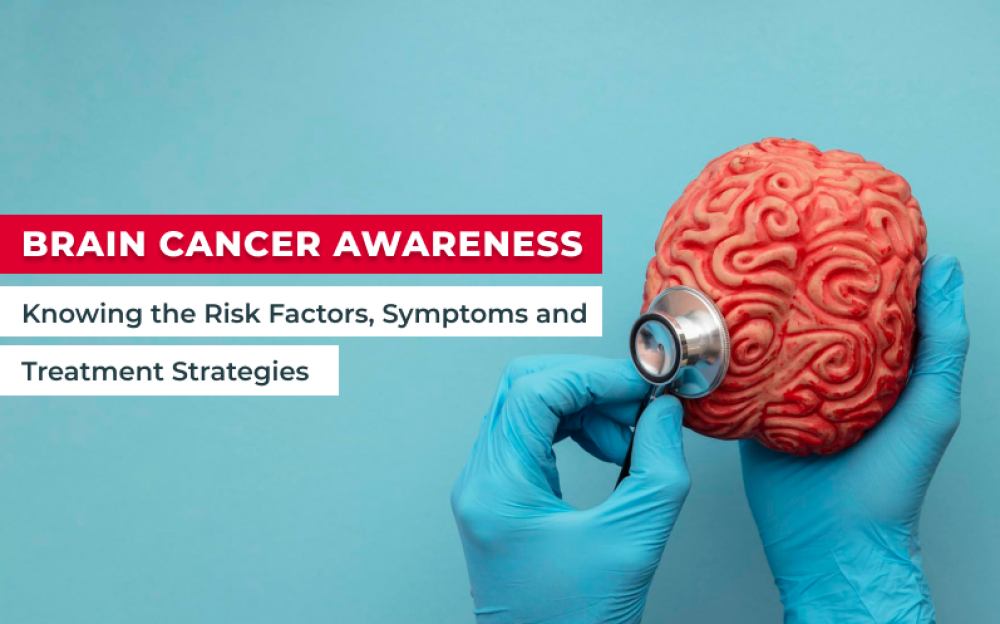

Introduction: Every year, 8th June is observed as World Brain Tumor Day with the purpose of raising awareness & educating people about brain tumors and also for paying tribute to those affected by brain tumors. Similarly, Brain Cancer Awareness Month is observed during the month of March in the UK, and every May in Canada, Australia & the United States. Considering these occasions, we are writing this special article on brain cancer.
But before we start, lets quickly understand the difference between brain tumor and brain cancer.
A tumor or tumour means a swelling of a part of the body caused by an abnormal growth of tissue. This can be benign i.e., non-cancerous or malignant i.e., cancerous. A cancerous or malignant tumor means it can grow and spread to other parts of the body. A benign tumor means it can grow but will not spread.
Thus, all brain cancers are tumors, but not all brain tumors are cancerous. Noncancerous brain tumors are called benign brain tumors. Benign brain tumors typically grow slowly, have distinct borders and rarely spread. Irrespective of whether it is a benign or malignant brain tumor, it can affect the brain’s function if they grow large enough to press on surrounding tissues.
It is a complex and often devastating disease that affects thousands of people worldwide. Despite years of research, brain cancer survival rates have remained little-changed in recent years, even while survival rates for many other cancers have been significantly improved. (Source: braintumor.org). According to medical professionals, brain tumour might become the second-most common cancer by 2030. The International Association of Cancer Registries (IARC) reported that there are over 28,000 cases of brain tumours reported in India each year and more than 24,000 people reportedly die due to brain tumours annually.
It is crucial to raise awareness about brain cancer, as early detection and timely treatment can significantly improve the chances of successful outcomes. In this blog, we will explore the risk factors, symptoms, and treatment strategies for brain cancer, with the aim of promoting awareness and understanding of this challenging condition.
As we read earlier, brain cancer refers to the abnormal growth of cells within the brain or its surrounding tissues. There are several types of brain cancer, including gliomas, meningiomas, medulloblastomas, and metastatic brain tumors. These tumors can develop from the brain tissue itself or spread to the brain from other parts of the body.
While the exact causes of brain cancer are complex and can be many, certain risk factors have been identified. These factors include:
1. Age: Brain cancer can occur at any age, but it tends to be more prevalent in older individuals.
2. Exposure to ionizing radiation: Previous exposure to radiation, such as radiation therapy for other cancers, may increase the risk.
3. Family history: People with a family history of brain tumors may have a higher risk of developing the condition.
4. Genetic conditions: Certain inherited genetic conditions, such as neurofibromatosis and Li-Fraumeni syndrome, can increase the risk of brain cancer.
5. Environmental factors: Prolonged exposure to certain chemicals, such as vinyl chloride and formaldehyde, has been associated with an increased risk.
6. Race: For e.g. some races such as Caucasians are at a higher risk of developing brain tumours than Asians or Africans.
The symptoms of brain cancer can vary depending on the tumor's location, size and growth rate. Some common signs and symptoms include:
1. Persistent headaches that worsen over time.
2. Seizures or convulsions.
3. Nausea or vomiting unrelated to other factors.
4. Changes in speech, vision or hearing.
5. Memory problems and cognitive difficulties.
6. Weakness or numbness in the limbs.
7. Personality or behavior changes.
8. Balance and coordination problems.
It is important to note that these symptoms can be indicative of other conditions as well. However, if any of these symptoms persist or worsen, it is essential to seek medical attention for a proper diagnosis.
Brain cancer diagnosis and treatments are carried out by specialist doctors such as neurologists, neuro-oncologists, neurosurgeons etc. who may first run a variety of tests & biopsies
The treatment of brain cancer depends on several factors, including the type, location and stage of the tumor, as well as the patient's overall health. The primary treatment options include:
1. Surgery: Surgical removal of the tumor is often the first-line treatment, if feasible, to reduce the tumor's size and alleviate pressure on the brain.
2. Radiation therapy: High-energy radiation is used to target and kill cancer cells, either externally or internally (brachytherapy).
3. Chemotherapy: Drugs are administered orally or intravenously to destroy cancer cells or inhibit their growth.
4. Targeted therapy: Medications are used to specifically target and attack cancer cells, minimizing damage to healthy cells.
5. Immunotherapy: This approach harnesses the body’s immune system to recognize and destroy cancer cells.
6. Palliative care: For advanced or terminal cases, palliative care focuses on improving the patient's quality of life, managing symptoms and providing emotional support.
It is essential to consult with a multidisciplinary team of healthcare professionals specializing in neuro-oncology to determine the most appropriate treatment plan tailored to each individual's needs.
Unfortunately, these cannot be prevented. However, you can reduce your risk by avoiding hazards such as smoking and minimizing exposure to excessive radiation.
If you have a family history i.e., sibling or parent who has been diagnosed with a brain tumor, it’s important to consult a medical professional who may recommend genetic counselling to see if you have an inherited genetic syndrome that’s associated with brain tumors.
Conclusion: Brain cancer is a complex disease that requires increased awareness and understanding. By recognizing the risk factors, identifying the symptoms & understanding brain cancer treatment strategies, as well as sharing this information, we can together encourage early detection, improve patient outcomes and offer support to those affected by brain cancer.
So, if you found this article insightful, please share this article and spread the awareness https://www.buddy4health.com/blogs/brain-cancer-awareness-knowing-the-risk-factors-symptoms-and-treatment-strategies

Low Blood Pressure: Understanding the Normal Range, Detection, and Natural Treatment at Home

Irritable Bowel Syndrome (IBS): What You Need to Know About Symptoms, Causes, and Treatment